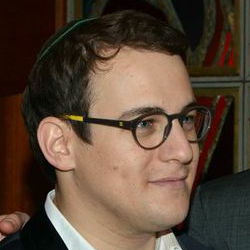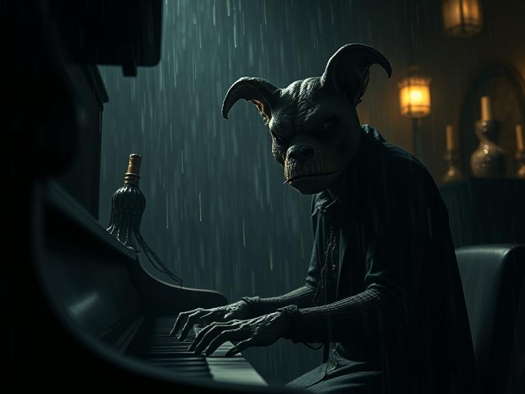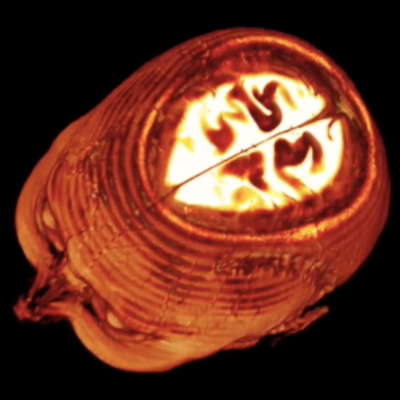 DISCUSSION: Composers Daniel Schorno and John Dante Prevedini discuss creativity, innovation and re-invention with Maria Nockin, Mary Mogil, Giuseppe Pennisi and Roderic Dunnett.
DISCUSSION: Composers Daniel Schorno and John Dante Prevedini discuss creativity, innovation and re-invention with Maria Nockin, Mary Mogil, Giuseppe Pennisi and Roderic Dunnett.
THE TITLE

Introducing 'The Pianistic Crown'
Recently I encountered in an antiquarian book shop a strange document, spiral bound and somewhat battered. It was a paper for a course in Music History (Piano) written at a small North American university. A grade of C- was given it, and the professor added a host of scurrilous insults to the student author. Red marks abounded.

Sadly, the student vanished from the face of the earth. Eventually, I located his family and asked of his whereabouts. They said he had travelled to the East and they had lost touch with him for nigh on fifteen years. Assuming his death (as the legal situation had already certified) they granted me permission to publish this document. The text has been reformatted for the web, but not altered in any way. Any typographical or grammatical errors are found as in the original. I have removed the footnotes and bibliographical material which radically encumber the reading. (One footnote is over five hundred words long.) Some required 'editorial' intrusions and are marked as such. References to the student, year of writing, university and professor (still on faculty after fifty-eight years) have of course been removed for the sake of privacy. The professor's remarks (with one exception) are removed, of course.

[Student's Name withheld at family's request]
December 12, 1998
For:
Professor [Name withheld].
For Music History (Piano)
University of [Name withheld]
Grade: C-
The Pianistic Crown
There's a story that Laurence Olivier was given a sword that had once belonged to the legendary actor Edmund Kean. The sword had been passed along down the theatrical generations to be given to the next great stage actor. Olivier never passed it on. What became of it is not certain.
[Commentator: A sword from Olivier's collection associated with David Garrick was sold not that long ago for a pittance. It may be that the stories and swords have become conflated.]
There is a scientifically discredited, but still poetically suggestive conception of the Alpha Male and male hierarchical relationships. The more accepted ideation is called Dominance Hierarchy. Without delving into this area I merely suggest that someone is always at the top of the heap.
Colin Wilson, in his book The Philosopher's Stone (1969, paperback 1974) mentioned an experiment on mice to determine if dominance is based on size. No. Wilson was also interested in whether dominance influenced longevity. Maybe. But, the recognition of dominance and dominant behaviour is old. 0
Olivier evidently had the symbol of thespian precedence and perhaps dominance and he kept it for himself. Still, the passing of the torch may be a requirement of holding it.
In music (taking merely the poetic ideation, not the scientific 'fact', or 'non-fact', if you prefer) we may ask 'Who then has been the Alpha Male pianist?' We may also ask who have been the secondary males in orbit around this central figure? Those associates (or hangers-on) I will name for only one Alpha figure in order to not over-encumber this essay.
Beethoven
Without question Beethoven was the first Alpha Male pianist. Prior to that the harpsichord was still dominant enough that Clementi arrived in Vienna still playing in that manner and upon that instrument. He learned quickly and subsequently took on the paternity of the piano ('The Father of the Pianoforte'). But paternity is not dominance as Cronus learned at the hands of his son Zeus. Thus, I suggest Beethoven was the first of the title holders.

Liszt
After Beethoven's death and for the next decade (plus or minus), the title was in abeyance, but the theatre of combat had also moved from Vienna/London to Paris. There, Herz, Kalkbrenner, Pixis, Thalberg, Liszt, Alkan, and Chopin (and even Czerny for a short time before he retired to Vienna again) among others, all vied for the title. The winner was clearly Liszt and his dominance is noted by no less than Chopin in Imperial and Colonialist terms. When told that a review by Liszt would make Chopin a 'fine kingdom', Chopin replied 'Yes, in Liszt's empire.'
[Commentator: From Alan Walker's biography of Liszt, volume 1, p 366]

Chopin indeed saw through the whole farrago.
Note that Liszt also took charge of the six days of Pianistic creation (no less) and dominated the other pianists in the 'Hexameron' Variations. Liszt certainly and finally won the title in a piano duel against Thalberg, but much groundwork had to be laid before that achievement. Liszt then went out on peregrinations of pianistic conquest much in the manner of Alexander the Great himself. He even conquered in Istanbul against the Turks (who probably had no idea what this was about). He scoured Russia and held the continent in the manner of a certain French Emperor of recent past.
Liszt also had a tale (if tale it be) that he had received a direct kissed blessing from Beethoven himself. This is the touch of the saint (or angel) which figures in virtually all hagiographical books (of fiction, auto-hagiography, or 'damned lies' as the case may be). But, Liszt, whose birth they say was heralded by a comet, garnished the title with this blessing of Beethoven.
With his death in 1885 there was another interregnum. Many vied for the title, like Anton Rubinstein, who surely deserved it more than anyone else, and even Hans von Bülow, but none ascended, until ...
Paderewski
Given his decrepit reputation it is hard to imagine how Paderewski claimed the throne. But, you see, the field of battle had changed and gone to America and there he slew the dragons of the critics, managers and public and he conquered. He also captured the hearts of the women-folk much like The Beatles later.
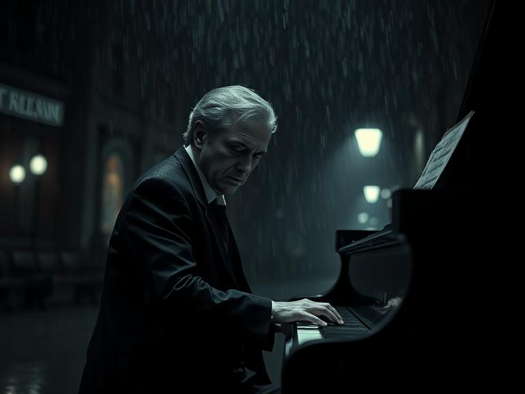
The critics also oozed in awe beneath his all-triumphant fingers and wrote such things as this:
Why Rubinstein is spoken of in conjunction with Paderewski's name I don't quite understand ... The protean versatility of Franz Liszt, he never had ... But Paderewski is as Liszt was - individual, poetic, a being of uncontrollable caprices, extravagances, fire, flame and fury and steel wrists, but cast in a mold of highly wrought delicacy such as Cellini would have modelled. Between Liszt and the young Pole there are many points of contact ... Liszt is reincarnated in Ignace Jan Paderewski - go hear him and then believe me. - J G Huneker, 'A Study in Old Cold', The Musical Courier, (New York, November 25, 1891), p 610
Already then in 1891 the title had passed. Huneker almost names it as such. 1 In his debut in New York, Paderewski played six different piano concerti at three concerts in the space of one week and played three different recital programs in the space of another week following.
[Commentator: The programs (except the first concerto performance) are provided in the Musical Courier issue just quoted. However the data seems conflicted.]
He played three more recitals a short time later in New York, presumably with different programs again making for six solo recitals. He had indeed conquered by such stupendous exertions.
Paderewski later travelled around the world giving concerts in South Africa, Australia and New Zealand, and of course, that gold mine of all gold mines: America. Note the Anglo-sphere fixation. I do not know if he ever went to Japan or China. Probably not. That was left for other pianistic travellers.
Paderewski wore the Alpha Male Pianistic Crown for the rest of his days (he died in 1941), rose to genuine political power (Prime Minister and Foreign Minster of the reconstituted Poland) though the significance of his achievement might be considered in that the British sent him aboard a destroyer, not battleship to Poland in 1919. And if one looks at the New York Times for his return concerts (after the political hiatus) in the early 1920s one will be dismayed that they were not front page, not even front and centre. They were just reported in a bland column. Only musicians have glorified them. He played the 'Emperor' Concerto (of course), 'imperially'. Of course. Yet, even Jacques Barzun (who was there) recalled little in detail.
But Paderewski was also the target of negative reviews even in the boonies (as we call them out West).
An aesthetic mind will find much to complain of in Paderewski's playing. It is not always beautiful nor good, but it is always interesting and impressive. - Squire Coop, 'Paderewski', Goodwin's Weekly (Salt Lake City, Utah), 10 Jan 1914, pages 9 and 11
But do not discount this, for it indicates that like all potentates his power did not extend to the furthest reaches as significantly as it did in the centres.
Throughout the decades from 1891 to 1941 other pianists swarmed but could not ascend. The throne was taken and held by the Polish Master who lived in central Switzerland (not surprisingly), not far from the headquarters of the League of Nations in Geneva. Of course, the intimations of world domination for the pianist as Alpha Male are evident.
Now while the title position is given a name (Alpha Male) it is also less well known that in the theory [Commentator: And even in more reputable ideation] the lower ranking men take up clearly defined positions and characters that can be found in many different situations. It takes time for them to find their roles, but they do and there are just a few roles to choose from.
What is also interesting is that if the Alpha Male is removed from a situation the remaining males vie for the spot, one wins and then the other males arrange themselves into new roles, which may be different from the ones they had before. I find that very strange!

But what are the roles? I offer here my list of the figures of pianism in the era of Paderewski and offer my description of their role in the hierarchy. Many names could be added, of course.
| Ferruccio Busoni | The Intellectual |
| Eugen d'Albert | Pianist Turned Opera Composer 2 |
| Vladimir De Pachmann | The Clown |
| Arthur Friedheim | The Recluse |
| Moriz Rosenthal | The Caustic One |
| Raoul Koczalski | The Everlasting Child Prodigy |
| Ignaz Friedman | The Far Traveller (like Marco Polo) |
| Serge Rachmaninoff | The Exile |
| Josef Weiss | The Madman |
| Josef Hofmann | The Monster 3 |
| Leopold Godowsky | The Buddha Enshrined in a Piano Studio 4 |
| Percy Grainger | The Outdoorsman |
| The Player Piano 5 | The Ghost in the Machine (deus ex pianistica) |
| Artur Rubinstein | The Epicurean Raconteur 6 |
I have often wondered who was the spy in this era, for surely there was one. Indeed, in the later twentieth century one pianist most certainly was a spy.
There are other pianists from this era, but this should be enough for current requirements.
Let it also be known that the secondary pianists of all eras have had a hard time of it. The very fabric of the universe is against them. Did not a famous pianist tell a student intent on a career in pianism that they should be prepared for a life of difficulties? Many talents of the most transcendental character vanish into oblivion, often impoverished, are totally forgotten (think Alkan), or are reduced to teaching, teaching and more endless teaching. Some retreat to a cave (perhaps well appointed, but a cave nonetheless), others vanish onto a faculty in a remote part of the musical world (anything other than Paris, London or NYC is considered remote even today) and some, like Alfred Reisenauer (according to some reports) and Ervin Nyiregyházi (almost certainly) descend into drunken stupor and/or alcoholic destitution. Few keep playing the piano. Some turned to recording, but in the absence of a record deal their legacy has been passed over. Perhaps modern technology will help.
[Commentator: This student essay was written in the late 1990s and so before the invention of YouTube where countless old pianists are now resuscitated/resurrected.]
And then as Paderewski's star waned (as all stars and even the Sun does, cf Max Müller), a new figure rose up in the East. And in 1928 he conquered. Paderewski could have retired. 7
Horowitz
Horowitz was labeled an Octavian, but not a Caesar for his excellent octaves by Moriz Rosenthal who knew the difference between Julius and his nephew's lesser capacities. He also knew octaves.
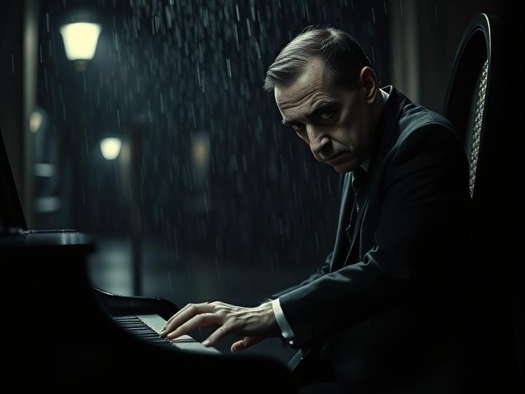
Josef Hofmann argued that Horowitz's technique could not last because it was based on tension and indeed, by 1950 Horowitz had collapsed. One person saw him in that decade and doubted he could be differentiated from a street person. But part of his troubles came from the King of Pianists inhabiting the court of the King of Conductors. It is not possible for the Emperor to attend the court of another Emperor. Indeed, it is hard for there to be two Kings of the World. Remember that Richard the Lion Hearted was called second to the higher King of France by a Saracen opponent. Even they knew the difference. I have always lamented Horowitz's position. But with Toscanini's death, Horowitz eventually found his way and retook his title. He held onto it until his death (much to the chagrin of Artur Rubinstein who tried to simply out-live him).
[Commentator: The professor's comment on this paragraph MUST be included here in its feverish red ink. He wrote: 'This is absolute nonsense, is some kind of ex post facto psychological analysis of a great artist at decades distance and without any psychological validation. You are not a psychiatrist and this paragraph is a vile insult to a great pianist. I should fail you for this alone!!!!!!!' The vehemence of the hand-writing on the page is astounding. The pen tore through the paper.]
I will not name the pianists who circled around Horowitz's court nor name their roles as it might offend many and disturb the peace. Take a gander at the history books and you might find some yourself.
With the death of Horowitz the crown title has lapsed. There is no one able to take it up because there is no Field of the Cloth Gold 8 upon which the tourney can be held. Modern piano competitions (childhood simulacrums of the life and death struggles of real musical warfare) do not a crown provide and also apply only to the young. 9 In the days of yore, pianists of all ages competed against each other.
But how many superb competition winning pianists slide into the most sad obscurity? Too many vanish, and so much talent is lost to this mammalian prejudice of the Crownéd King. We never cease to ponder it. It remains the subject of people's yearnings (messianic yearning of course). It appears here in the pianistic world.
Are we awaiting a new pianistic saviour? Perhaps one with a plunging décolletage?
There is no brow yet able to bear the crown and so it molders away in the tomb where Horowitz is buried.
Today many pianists now struggle to wear the crown: the clown, the salonist, the recluse and so on. There are many of each, often with an unusual twist in appearance or manner. But none yet hold aloft the crown to be borne upon their own brow nor have some Laurence Olivier beknight them with a symbol of potency. (Remember Liszt wore a sword.)

Perhaps a new Emperor will claim the lapsed throne. Shall there be a new King or Queen? Or shall we outgrow this mechanism where one dominates to the detriment of others and instead become a world where ALL can flourish?
Copyright © 1 April 2025
Reginald Twiddlebrain,
North America



